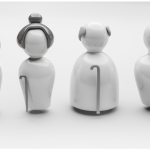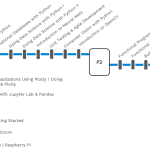The big Q&A on future of work, tech trends and digital transformation
For me, the 49 episodes are also 49 episodes with fellow companions who also believe that we can make this country and Europe and the world a little better by pushing a few things forward. This motivates me personally, because I want to help ensure that my three children can live in prosperity here. Therefore, we won’t be able to get around digitalization.
Jan Veira
Jan Veira is already celebrating his 50th podcast anniversary with Digital4Leaders – and we (University4Industry) are publishing a special episode to mark the occasion: Jan Veira has already interviewed 49 guests on the podcast, and now the 50th anniversary episode has been published with himself in the spotlight. Interviewed by the U4I marketing and communications team (Anna Vanessa Evertz and Simone Hauser), Jan Veira devotes an hour to the questions of his guests and listeners, providing an all-round perspective on tech trends, the future of work, digitalization and future skills. The result is an hour-long conversation full of insights from the world of education, thoughts on current trends such as ChatGPT, Metaverse and Augmented Reality, and a look at the working world of the future.
What are the topics of the 50th episode of Digital4Leaders?
Former guests and loyal listeners have asked for Jan Veira’s expert opinion on digitalization, future competencies and technology trends. Why should companies invest in digitalization if everything is going well anyway? Or what are the consequences of introducing digital technologies? Won’t jobs be lost? Jan Veira has the following to say about this in the podcast:
That’s sometimes the reality of why people don’t invest in digitalization: We’re doing just fine. Why should we change anything? To put it bluntly: So that it stays that way! So that a company remains successful. So that a company remains fit for the future and continues to generate such nice profits. There is no way around change. And there is no way around investing in digitalization.
Jan Veira
We also asked Jan Veira which topics he sees as particularly innovative and which trends he thinks are currently getting too little or too much attention. In the interview, he questions the added value of education in the metaverse and reports on use cases of augmented reality in companies in the production and service environment. There is no question that Germany often lags behind other countries in the implementation of such digital solutions. However, according to Jan Veira, there are nevertheless characteristics from which German companies can also benefit in terms of digitalization:
What is Germany strong at? I think we’re good with things like data protection. Like the fact that we are very active in talking about issues like ethics in AI. That’s not a negative thing at all. I think that sometimes that also leads to us being a bit slower. But that’s definitely positive because it makes perhaps more sustainable in how we deal with digital issues. Another good thing is that we think about things very systematically. That we first define the standard and then we do things. In an increasingly fast-paced, increasingly innovative, digitalized world, that is sometimes negative, but it will perhaps pay off in the long term.
Jan Veira
In the anniversary episode, Jan Veira, with his expertise in education and technology, also gives his thoughts on the topic of future skills:
I think a very different skill that unfortunately you can’t learn by watching a video is learning to learn. That’s quite important for the future because we’re in this exponential growth of innovation. We’re not at that point anymore – like my father’s generation – they did an apprenticeship, and then they had finished that and were done. I think we all agree that’s over. The jobs, the requirements, are changing so quickly.
Jan Veira
We also received a number of questions from guests and listeners about the working world of the future, which Jan Veira answered in the interview. An excerpt from the interview:
Jobs that are more in office buildings and those that have to do with knowledge and knowledge processing in the broadest sense, those will use AI tools and data-based tools. They’re going to change more there than we can imagine. When we say digital future of work: On this time horizon of three to five years, we will see a surprising amount, especially in terms of augmented reality. There will be more job profiles and more fields of work that will be supported and changed by AR solutions than we think at the moment, because we are still surprisingly far at the beginning.
Jan Veira
Innovative strength and new work were also a major topic. In particular, the question of how a new, innovative working environment can be made possible and what mindset is required from employees and management to achieve this emerged more frequently. Jan Veira particularly emphasized an open culture of trial and error, agility and appreciation for employees.
I believe that in order to allow innovation and also new work and new ways of working, it is very important to allow mistakes. New work has been very much reduced to the issue of working at home. And I believe that if you’re in a corporate culture that says, we’ve tried working at home now, it hasn’t worked, now we’ll do everything the way we did before, that can’t be the answer. That’s also not how Silicon Valley companies, with their insane innovative power, have become so strong over the last 15 to 20 years. They have become so strong because they have worked in a very agile, very iterative way.
Jan Veira
Questions about ChatGPT, the change of knowledge through technology as well as the influence of Corona on digital education are also topics in this special episode: How do technologies like ChatGPT or Generative AI actually change the learning and knowledge transfer of today and tomorrow? What role does the topic play in education? What is the significance of knowledge “at and for” people, when this is increasingly in competition with searches, knowledge databases and AI-based bots (like ChatGPT)?In addition to answers to these questions, Jan Veira also gave tips on how to avoid falling into the buzzword trap with all the new hypes and trends, but to pass on sound knowledge in a way that is both relevant to insiders and not overwhelming to laypeople. At the end of the episode, listeners will hear Jan Veira’s personal highlights from the last 49 podcast episodes and his most memorable experiences and learnings.
This podcast episode is part of the Digital4Leaders podcast launched by University4Industry (U4I) in August 2021, which, in line with U4I’s mission, aims to enable listeners to “learn in order to act“. In the podcast, Jan Veira regularly talks to experts and thought leaders from the field who initiate, help shape and contribute to topics such as Industry 4.0, digital transformation and new work. Impulses are given, contexts are presented and enthusiasm for the topics of the future is awakened. As always, the podcast episode can be heard on all popular streaming services (Spotify, Apple Podcasts, etc.). Since this is the 50th anniversary, Jan Veira and his team have taken time for a longer episode than usual and also filmed the recording. The special episode is thus also available as a video via YouTube.
LISTEN TO THE EPISODE on THE WEBPLAYER OR ON SPOTIFY, APPLE PODCAST AND CO.


